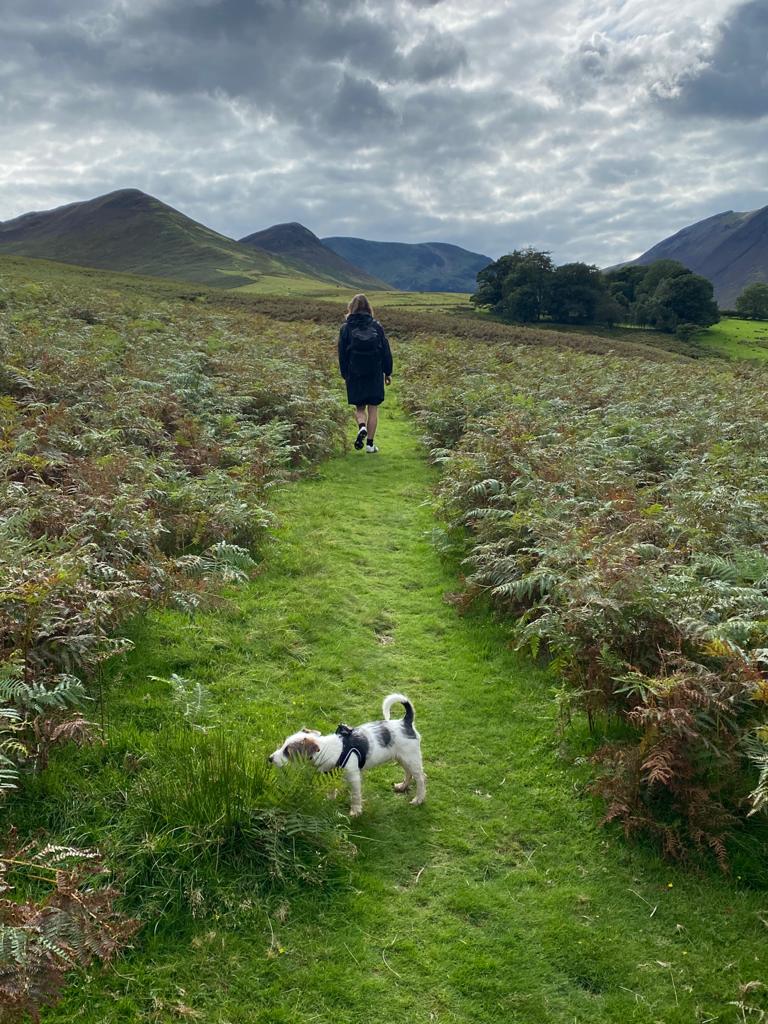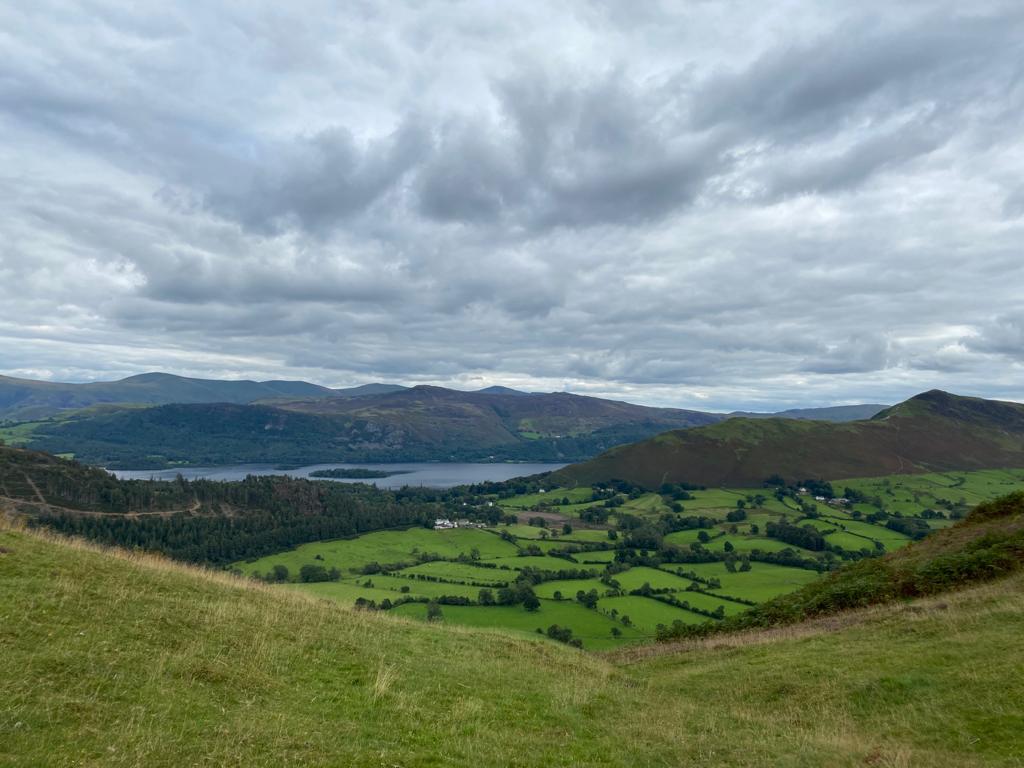Stylist’s fitness editor Meriam Ahari discovered her newfound love of hiking when she visited the Lake District – and she’s sharing why we should all be taking up walking more.
The concept of walking to stay fit has always been lost on me. As someone who gravitates toward high-intensity, cardio-heavy workouts such as HIIT or boxing, I never saw the point. The thought of promenading at a leisurely pace for exercise felt reserved for those elderly couples in colourful tracksuits that you see doing laps in the mall. If a session didn’t leave me dripping with sweat or lying on the floor gasping for air, I wasn’t interested. That is, until a trip to the Lake District gave me a newfound love of hiking – and made me realise just how good it can feel to simply walk in nature.
I went into my holiday thinking that I’d be traipsing languidly over rolling hills (obviously I’ve never been hiking before, nor been to the Lake District), but the region’s rugged terrain and steep incline gave me a run for my money. One of my favourite treks was going up Crag Hill in Braithewaite, that overlooks the vast valleys of Rannerdale to the west and Coledale to the east – while offering breathtaking views of two major lakes (Derwentwater and Crummock Water) on either side.

As we climbed each towering slope – and what I was convinced was the home stretch – we’d get to the peak, only to realise that it dipped before another soaring hill rose in the distance. I wasn’t even one quarter of the way up the mountain before my back was dripping with sweat, my thighs began screaming and I was too out of breath to finish my sentences. I’m not selling it, I know, but I swear that getting there was half of the fun. And once we finally got to the top, the view was worth the muddy bottom that I got after slipping on what I really hope was not a pile of cow crap.
Between the fresh air, gorgeous views, and major burn in my calves, I ended each day feeling exhausted, yet re-energised from the climb – with a sense of fulfilment and mental clarity. Despite the winds and rain, I actually woke up every morning with a desire to do it all over again. Walking in nature – far from any working signal or wifi – transported me miles away from the concerns and obligations waiting for me at ground level. Sharing one collective goal – to climb to the top – with everyone I met or was with, reminded just how beneficial hiking is for not just my body, but my mental health too.
Here’s why I’ll be taking to the hills more often – and why I’m encouraging others to do the same.

Return to nature
One of the biggest perks of hiking is also the most obvious: you get to spend time in nature, which studies prove can help to improve your mood and reduce feelings of stress or anger. According to a recent report, spending at least 120 minutes per week in nature results in an improved sense of wellbeing, while living in greener spaces is associated with reduced risk of cardiovascular disease, diabetes and mental distress. “We all know that simply walking is great for both physical and mental health, but a rapidly growing body of evidence tells us that walking ‘in nature’ can actually amplify the health benefits,” explains Dr Zoe Williams, GP and member of the Strong Women Collective.
Get a great workout – seriously
While taking a stroll might not feel as exerting as running, its positive impact on our body is immense. For one, it’s the perfect low-impact exercise for those who experience knee or hip pain when running. It’s a fact: walking is just as effective as running as it promotes similar benefits such as improved blood circulation, prevention of bone loss and supports joint health.
According to researchers at the Harvard School of Public Health in Boston, women who walk 30 minutes per day reduce their risk of stroke by 20% – and by 40% when picking up their pace. Not to mention that scaling a mountain is like spending a day on a stair master. “Hiking is a great cardiovascular workout, but the uphill resistance is similar to strength training. With every step that you take, you’re having to lift your entire body weight up the hill with it – so in a way, you’re also weight training,” explains trainer and athlete Risqat Fabunmi-Alade.
While you may feel the burn mainly in your calves, hiking is really a full body exercise. “Hiking targets your hip flexors, quads, glutes and calves specifically, but all the surrounding muscles will work hard too,” explains Risqat. Which explains why my core randomly felt sore on the second day of our trip.
“When going up hill, your calves in particular work harder than usual because of the angle that your foot and ankle are taking with each step. As you plant your foot, your body is working concentrically to help lift you up and overcome the resistance,” Risqat adds.
You may also like
Health benefits of walking: research that proves we should all be walking more
Pick your pace
The beauty of going on a hike is that you can move at your own tempo – unlike gym or spin classes that leave us compelled to keep up with everyone else. There’s no better excuse to rest aching calves or gather your breath, than by stopping to take in the scenic views around you (or even rest for a picnic to refuel your body).
Risqat suggests breaking up your climb with several leg stretches in order to prevent inury. “Calf stretches are ideal as these muscles are working overtime – moving on an incline might be a shock to them when they’re used to being on flat ground. For a bonus stretch, try a kneeling hip flexor stretch which helps loosen up your quads.”
Clear your mind
Williams Wordsworth – the famous English poet responsible for creating the genre of romanticism – was born in Cockermouth, Cumberland (an incredibly picturesque region in the Lake District). It was in Grasmere, where he later moved to Dove Cottage that he wrote many of his famous pieces such as The Prelude. Surrounded by the peaceful (and quiet) mountain range, it’s no surprise that the writer drew inspiration from the great outdoors.
Many of us find that simply taking a quick walk outside during the work day can help to reset and clear our minds – just imagine what half a day of being surrounded by nothing but nature and clean air can do for our mental health. A recent study on 20,000 people found that those who spent two hours per week in “green spaces” such as parks or the forest, reported better health and psychological well-being than those who didn’t.

Connect with others – or not
Hiking is arguably the most inclusive physical activity because it applies to everyone – no matter your experience level. It’s a fairly simple sport – no rules, no skills required (thankfully for me, as I’ve never been an athlete) – that you can share with people of all ages, and even take the dog along (which we did).
If you’re keen to share the experience with someone, walking together for long stretches of time allows you to spend quality time together, uninterrupted and allows you to enjoy the silence without any awkwardness. If you prefer going solo, it’s the perfect environment for enabling you to be alone in your thoughts (again, uninterrupted) while enjoying mindful exercise.
Pat yourself on the back
There’s nothing like spending hours devoted to reaching one goal – and then achieving it that same day. For me, getting to the top of every mountain felt akin to crossing the finish line of a marathon – at times, I almost didn’t think I’d make it there, but once I did, I felt that I could (literally and figuratively) cross any mountain I came across.
While I still find it hard to shake my go-hard-or-go-home mentality at times, my trip to the Lake District taught me to revel in the joy and inner peace that slower-paced, mindful movement can bring. So much so, that I plan on spending more of my weekends exploring the local hills, valleys and mountains that the UK has to offer. Whether you’re looking for a day trip or a long weekend away, we’ve rounded up a list of our favourite hiking spots here.
You may also like
The best hikes in the UK to reap the benefits of power walking
Follow @StrongWomenUK on Instagram for the latest workouts, delicious recipes and motivation from your favourite fitness experts.
Source: Read Full Article
